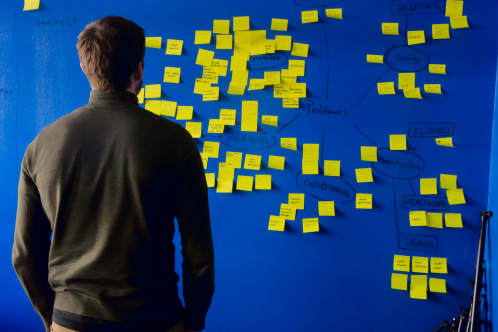Companies are studying the uses of blockchain technology as cryptocurrency becomes more relevant. According to Microsoft’s Midwest CTO, the term “blockchain” is so buzzworthy, that Kodak used it in a product name (completely unrelated to blockchain technology) and saw their stock value quadruple. It’s important to know that Blockchain is not a cryptocurrency, rather, it supports cryptocurrency in a secure, shared, distributed ledger.
Our Sphere team attended a few conferences in Chicago regarding blockchain and Ethereum cryptocurrency smart contracts to get a better glimpse at the many uses of blockchain technology. In this article, we’ll recap those events and point out the different ways developers are using this technology to build and theorize decentralized applications.
What is Blockchain Technology and Why Would One Use it?
Blockchain refers to a vast distributed ledger that eliminates intermediaries who add no value to a transaction, reduces fraud because of public keys that show where currency is being distributed, and is highly scalable. Compare this to a centralized ledger, like a bank, which oversees millions of accounts making it a single point of failure. Centralized ledgers may also contain various transaction fees and overhead costs, which can reduce the speed and efficiency in which transactions are made.
A blockchain ledger is just a growing list of records, called blocks, that are secured using cryptography. Every peer-to-peer action taken on a blockchain is time stamped — and because the database is immutable, the data is resistant to modification. Even though the first blockchain was conceptualized in 2008, the explosion of cryptocurrency in today’s market has helped advance blockchain technology.
Cryptocurrency aside, developers see the potential in blockchain because of its ability to put full control in the hands of the user. Without powerful third-parties in the way, application concepts using blockchain technology are emerging every day.
Smart Contracts Executed on Blockchain Technology
Unlike other cryptocurrencies which are primarily focused on the exchange of currencies, smart contracts developed on the Ethereum blockchain can manage financial, semi-financial, and non-financial agreements — such as encrypting voter information for an election. Smart contracts have undoubtedly opened more opportunities for businesses and developers in the blockchain industry.
Once the conditions are set, these crypto-contracts can be fully executed without the need of human interaction. For example, Conrad Barski, CEO of Forward Blockchain spoke to us about his favorite band that he wanted to send either money or Ether (computational code used for payment on the Ethereum blockchain) to help finish their latest album. The band joked about being sent Ether, and asked if the Ether could be distributed in three portions to help motivate them.
If Barski wanted to, he could have programmed his smart contract to distribute portions of that Ether once the band satisfied their end of the contract. In the case of this band, they needed three songs to finish the album. Each completed song would have successfully prompted a third of that Ether — all without human interaction.
Smart Contracts and Social Media
Another interesting concept we saw utilizing smart contract technology is an open-source project called TweetWallet, which is basically the distribution of Ether through a user’s Twitter account. The motivation behind TweetWallet is to improve the state of private key management.
In a decentralized peer-to-peer blockchain, every user has their own unique private key — this is their identity. However, the current state of private key management can be cumbersome for the average user. TweetWallet wanted to take the easy-to-use platform of a social media channel like Twitter, and give users the ability to send and receive Ether with the help of smart contracts.
Source: Tony Klausing, developer of TweetWallet
The developer of TweetWallet pointed out a few challenges that remain with the application. First, social media accounts aren’t always trusted third parties because not all accounts on Twitter are authentic. Also, TweetWallet uses Oraclize to provide an ID that identifies the data within the smart contract and then sends a key to the user the transaction is meant for. Oraclize is a widely trusted third party, but at the end of the day it’s still an intermediary.
Smart Contract and Health Services
Conrad Barski, a 14-year doctor and Ethereum smart contract developer, created Forward Blockchain in hopes of changing the ways hospitals everywhere store their data. Barski noted that data storage practices in the medical industry have always been very traditional, and therefore, massive amounts of data are stored in many databases. This presents a threefold problem:
- This amount of data storage — whether cloud-based or hardware-based — is incredibly expensive.
- These databases need constant oversight and management from IT experts, which can also be expensive.
- Every new server is a potential server that can be hacked. Since these databases store extremely sensitive information, a data breach can be detrimental to a hospital.
His solution is Forward Blockchain, a decentralized database for hospitals on the Ethereum blockchain. Although HIPAA-sensitive data is best kept (for now) on a traditional database, much of the other data has little use being stored there. With Forward Blockchain, everything from medical licensing and certification information to equipment inspection reports can be easily stored, secured, and accessible to hospital employees.
Source: Youtube user, Peter Ryszkiewicz
“This is the type of data that many hospital employees should be able to access. It makes no sense to store employee lists or drug formularies in the same place as a patient’s blood pressure history.”
One way Forward Blockchain uses smart contract technology that allows many people to read, but few to write, involves patients checking up on a doctor’s licensing or certification history. On the same platform, government officials can update a doctor’s current licenses or certifications when necessary.
The Future of Blockchain, According to Crypto Experts
A panel of crypto experts across various industries discussed what they think the future of blockchain technology is at Tech in Motion’s latest event in Chicago. The general consensus was that utilizing blockchain was an “homerun” in industries like file storage or identity management where all assets or licensing information is digital. For example, if your income relies on digital rights management like a stock photographer or a musician, blockchain technology may be perfect for you.
However, panelist Daniel Mason, Vice President of business development at Springcoin, said that there could be difficulties when attempting to fully implement blockchain technology in the medical or supply chain industries. He used Forward Blockchain as an example, and its limitations because of the laws surrounding patient-sensitive data. Barski agreed, and stated that HIPAA may have to be amended before fully storing hospital data on the blockchain.
Dr. Tejas Shastry, Vice President of data science at GreenKey Technologies, said that banks can also look towards blockchain technology to help them work with other financial institutions and take away some of the costs they incur on central recordkeeping. As our understanding of blockchain develops, banks will try to make interbank transactions more secure for customers.
Conclusion
Even though blockchain technology is far from perfect, it’s the latest innovation that has demanded the attention of developers and investors everywhere. Blockchain technology is still in an experimental stage, and everyone from your local startup to tech giants like Microsoft is trying to gain a better understanding of it. At Sphere, we’re also excited to increase our knowledge of blockchain and smart contracts, in order to find ways of applying this technology to help our clients.





